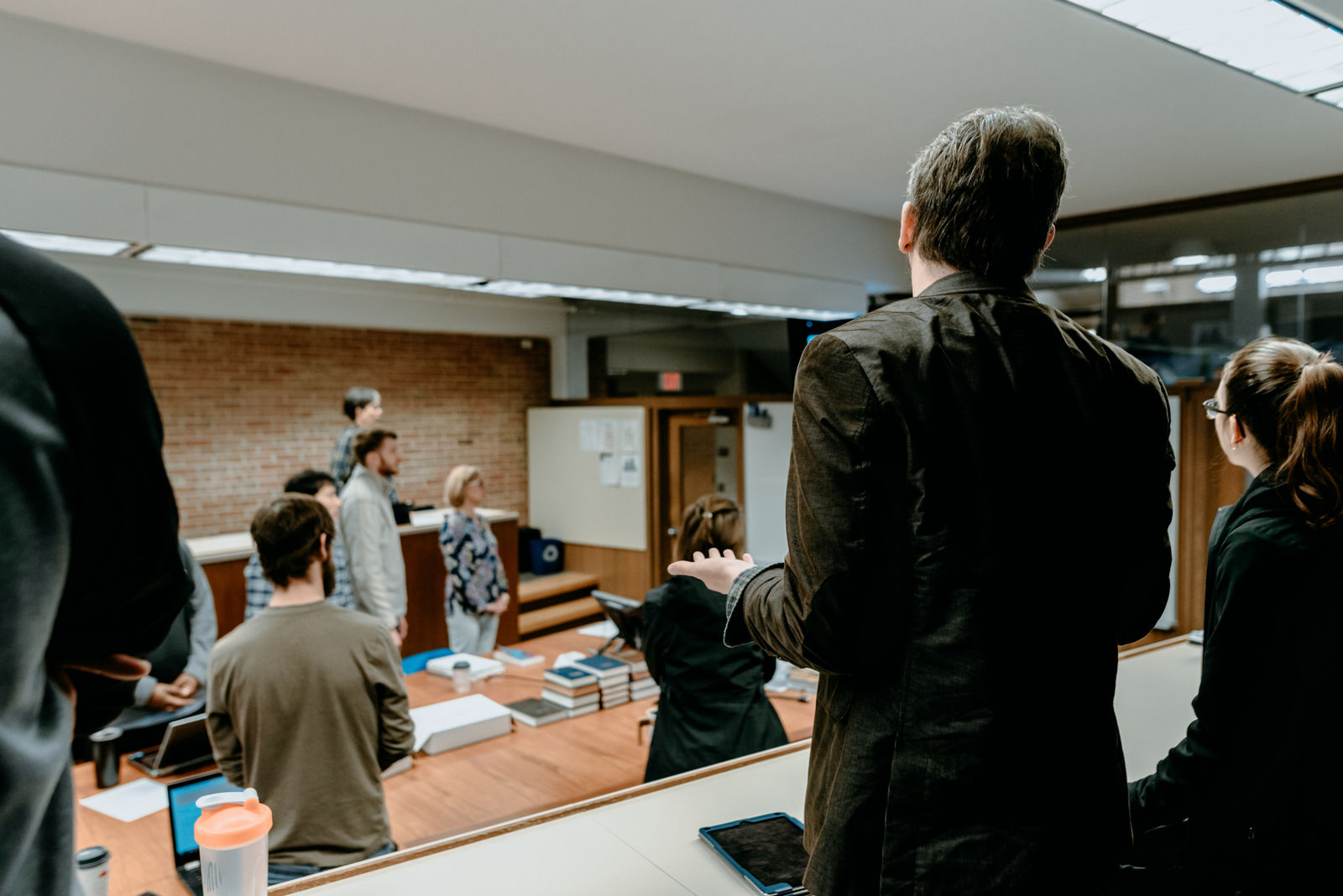Doctor of Ministry (DMin)
What Is a Doctor of Ministry?
The Doctor of Ministry (DMin) is an advanced program designed for ministry professionals who have completed a master’s level degree—often, but not exclusively, an MDiv.
What Can I Do with a Doctor of Ministry?
The following are just some of the vocational and ministry paths that a DMin can prepare you for:
- Pastor
- Youth pastor or youth director
- Worship pastor or worship director
- Ministry director
- Parachurch ministry leader
- Denominational ministry leader
- Nonprofit leader
Available Concentrations
Doctor of Ministry: General Track
Ministry leaders can pursue their specific or broad area of ministry interest and vocation through this general and customizable track.
Doctor of Ministry: Homiletics
Ministry leaders in this concentration love preaching. They are eager to build their expertise and understanding of effective strategies, structures, deliveries, and frameworks for preaching that will sustain and build the faith of communities. Building on the excellent programming of our partner, The Center for Excellence in Preaching, students will propose projects that help the church proclaim God’s good news in effective ways.
The timing of classes associated with this concentration may, at times, be uniquely different from the regularly scheduled DMin residential times. Students should be prepared to attend CEP seminars when required.
Doctor of Ministry: Urban Ministry & Prophetic Method
Ministry leaders in this concentration will develop their ability to see, understand, and engage urban contexts. They will understand the role, leadership, and financial management of non-profit organizations in the urban core. Building on this analysis, students will then develop prophetic methods for personal and organizational resilience and endurance. Dissertations in this concentration will serve to empower and equip urban leaders and organizations for transformational work.
Doctor of Ministry: Spiritual Formation & Missional Leadership
Ministry leaders in this concentration will dive deep into discoveries about leading change, decision-making in community, increased levels of self and communal awareness, and the use of case studies. This concentration will propel students to propose and research tangible ways for their organizations to more effectively model the missional character of God.
Our Doctor of Ministry Program
Through the DMin program, your ministry will benefit from intentional coursework, spiritual direction, and formative peer relationships.
DMin Courses & Credit Hours
The DMin at Calvin requires 36 credit hours, including the core courses below. The themes and framework of these courses will serve as a foundation for your program.
The Abbey
This is the start of DMIN studies at Calvin Seminary. The Abbey is focused on three objectives. First, it is the orientation to the DMin program itself. Second, it is a time of introduction to peers who are beginning the same program at the same time. And finally, it is a reflective time of self assessment and individual contextual analysis. Students will be expected to start the process of unraveling their ministry questions on conversation with others.
Ethnography
Ethnography involves the observation and study of people in their natural settings. Its potency resides in its ability to undermine assumptions and give voice to those who have been previously muted. This course will have its own context and its dynamics hopefully yielding more complicated and less linear explanations of that which is central for the student’s research. Throughout the course students will build a theoretical and analytical “toolbox” for considering the church as a social institution embedded within a wider societal context. The “toolbox” will, hopefully, allow students to attend to the actual life of the church and, in turn, process those patterns and habits through a theological lens that allows for strengthened ministry settings.
Interpreting Culture & Ministry Contexts
This course introduces students to the process of exegeting culture and social contexts, and the correlating impact it has on individuals, churches, and the surrounding communities, all for the purpose of creating effective and appropriate ministry. Attention will also be paid to the relationship between that exegetical findings of culture/ context and the personal development and role of the individual leader within that context.
Mission of the Church
This course will encourage students to develop clarity and precision regarding the meaning and purpose your work has in God’s economy. It is also designed to spark your imagination of how God intends for you and others to participate in his mission in and through your daily work.
Transformational Leadership
This course will insist on critical engagement with current models and outcomes for ecclesial and Kingdom leadership. Using a Case Study methodology students will be asked to develop a theological framework for applied leadership solutions rooted in a telos that reflects the Gospel for their context.
Return to the Abbey
Once a student has registered for and/or completed 24 credits, they may join in the Return to the Abbey course. This trip to the Abbey serves a variety of functions, including: a) a return to self reflection and an understanding of the growth that has taken place personally over the course of studies, b) an oral exam in which the student will be asked to demonstrate personal and theological insights associated with course work and development, and c) overall theological understanding and insight sufficient to warrant the proposal and pursuit of a major thesis project.
Electives
Partnered with your required courses will be elective courses led by current scholars and practitioners designed to meet the needs of ministry leaders.
Doctor of Ministry: Online & Residential
Our DMin program is hybrid (online and residential) to offer you the flexibility of online learning while building true community, both in person and online. Coursework is completed through our interactive online learning platform for 11 months out of the year. Students also come together for two required, on-campus learning sessions per year.
Reformed Tradition
Calvin is a seminary teaching in the Reformed tradition and serves as a ministry of the Christian Reformed Church in North America. The DMin program has always welcomed and will continue to welcome students from a variety of Christian faith traditions to join together in ecumenical development for ministry.
Guiding Values
We believe God’s Kingdom is diverse.
This is evidenced by the varied ethnic traditions, theological perspectives, and practices and insights used for ministry. By cultivating learning cohorts that reflect this God-authored diversity we will invite students to learn in an environment that is rich, deep, and faithful to the ideals of the Gospel itself.
We believe this degree program must serve local churches and leaders.
Therefore, we insist — in pedagogy, classroom engagement, peer groups, and conversation — on beginning with the challenges and opportunities facing our students as they engage in ministry. Students should expect to bring their ministry to the classroom as the starting point for reflective learning. Using inductive, curated, seminar-like conversations, we hope to cultivate communal and particular learning for ministry.
We believe that listening well is crucial for effective Kingdom leadership.
Consequently, our DMin program will strive to engage a listening posture by: a) utilizing faculty who listen well to students; b) insisting that students grow in their own ability to listen well – both to one another and to their ministry context; c) equipping students with effective ethnographic tools; and d) asking students to engage their particular disciplinary lens (i.e. missiology, worship, pastoral care, evangelism, etc.) and demonstrate the capacity to “listen well” to the implications of their work for another context simultaneously.
We believe that life and ministry are complex.
As a result, we are committed to an interdisciplinary and contextual experience throughout the program. Students will regularly be asked to place their experience, knowledge, and insight at intersections of other contexts, disciplines, and human experiences. In so doing students will deepen their understanding of God, the redemptive work of God’s Kingdom — and of the very Gospel itself.
We believe that effective ministry is the product of excellent research and development.
In fact, we are convinced that the church universal is best served by ministry leaders who relentlessly search for truth and wisdom wherever it can be found. Faculty and students will share the responsibility for gleaning ministry contexts, conversations, and integrative learning for crucial insights. The apex of the students’ work will be the writing of a doctoral thesis which responds wisely and biblically to the questions, needs, and concerns of the communities the students are serving.
We believe this degree program should make a difference.
Upon graduation students will be grounded in their personal sense of vocational calling and pastoral identity. Students will be empowered to implement the theologically informed ministry featured in their thesis project in ways that evidence the redeeming work of Christ in our world. Students will also possess a critical set of analytical tools and worldview which will enable them to engage other opportunities and challenges in their respective communities.
Finishing Your DMin Degree
How Long Does a DMin Take?
The DMin program is intended to be completed in five years
Graduation Requirements
Coursework
Completion of 36 credits of coursework, including up to 12 credits of electives and Directed Doctoral Studies.
The Abbey
Participation in “The Abbey” and the “Return to the Abbey”, both significant episodes of self-reflection and learning in the academic process
Oral Exam
An opportunity to showcase theological and personal learning by way of an oral comprehensive exam prior to launching your research project
Doctoral Dissertation
This is the culmination of your theological learning, peer learning and personal reflection. Your dissertation will be a demonstration of theologically informed and contextual thinking in which you display research findings and ministry models that will address the challenges of ministry in your context and in the broader context of effective ministry today.
Program Outcomes
Graduates of Calvin Seminary’s DMin program will have:
- Demonstrated growth in theological integration, awareness, and ministry skills through critical thinking skills and applied research methods regarding the scope and practice of ministry
- Developed the ability to assess diverse ministry contexts to determine effective transformational ministry models
- Developed critical research skills enabling them to develop theologically informed, practically oriented ministry models rooted in qualitative/quantitative research
- Completed a doctoral-level project that contributes new knowledge and understanding of the practice of ministry
- Demonstrated capacity to engage in ongoing learning, including acts of self-care, peer-to-peer relationships, and vocational growth for ministry longevity and vitality
How to Apply
The following steps are required as part of the application for the Doctor of Ministry program:
- A completed application
- An up-to-date resume (you will be asked to upload this document within the online application)
- Three online recommendations, including two ministry leader recommendations and one writing recommendation. The online application will ask for you to provide the email addresses of your three references. After your application is submitted, an email form will be sent to these individuals to be completed.
Within the online application, you will be asked to submit three essays, using the following prompts:
- Learning Goals: In an essay of up to 600 words, describe why you are pursuing a DMin, including some of your personal learning goals.
- Self Assessment: In an essay of up to 600 words, evaluate your own intercultural competence, spiritual maturity, and ministry skills/capacity.
- Problem/Purpose Statement: In an essay of up 1000 words, describe 2–3 ministry challenges from your own context which are significant challenges, and which could drive your participation and research in the DMin program.
In addition to the application, official transcripts from any college or university you attended will be required. They can be sent to: Calvin Seminary, attn: Admissions Office, 3233 Burton St SE, Grand Rapids, MI 49546.
Tuition is $318 a month for the 2023-24 academic year, billed 12 months of the year. DMin students will also be required to pay for any fees related to course work including but not limited to:
- Travel costs to the semi-annual Residential portion of the program
- Books
- Additional technology-related costs (note: students will be required to have access to reliable high speed internet)
Calvin Seminary offers a wide range of scholarships and other financial assistance. In fact, in recent years, nearly $1.5 million in scholarship funds were awarded annually.
Application Requirements
Admission Deadlines
Calvin Seminary admits a new class of students to the DMin program every summer. In order to be considered for admission, all application materials must be submitted by February 9.
Admission decisions will be communicated to applicants by early March. A limited number of students are admitted each year. Applicants will be admitted, waitlisted, or declined admission to the program.
Admitted students must accept their admission by submitting a $250 enrollment deposit by March 18, and can plan to begin their coursework by April 1.
Frequently Asked Questions (FAQs)
Apply Now
Start your DMin journey today when you apply now.
Get to Know Calvin Theological Seminary

Meet Your Faculty
Faculty at Calvin Theological Seminary carry out the seminary’s mission as inspiring thought leaders, invested teachers and mentors, and committed followers of Christ.

Student Stories
Past graduates have applied their learning to a variety of ministry-based opportunities. Here are some of their stories.

Academic Support
In addition to contextual learning, the Vocational Formation Office offers students other forms of support, including formation groups with peers, vocational mentors, and assessment tools to help students identify and cultivate their strengths.
